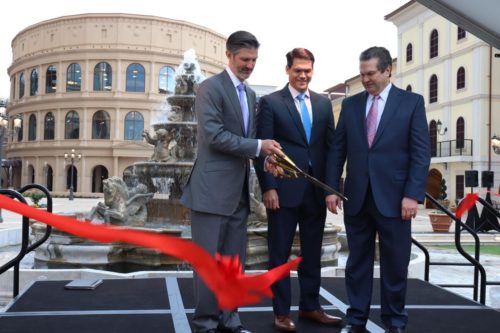
A health care staffing company with strong political connections has been paid more than $40 million by the state of Georgia to supply medical workers to fight COVID-19.

Rick Jackson
Jackson Healthcare, a private company based in Alpharetta, was asked by state officials for help in March. That’s when Phoebe Putney Memorial Hospital and the city of Albany as a whole were swamped by virus patients, making the area a national hot spot for the disease.
The company, after getting a no-bid contract, has supplied medical staff, from doctors to nurses to respiratory therapists, to more than 50 hospitals and 80 nursing homes across Georgia over the course of the pandemic, through its subsidiary, HWL.
Jackson Healthcare’s HWL is still providing these temporary workers, either through its own staffing companies or others, with about 2,000 medical personnel on the ground in Georgia now, said Shane Jackson, president of Jackson Healthcare. Most of them are from staffing agencies unaffiliated with Jackson companies.
Shane Jackson’s father, Richard L. “Rick’’ Jackson, chairman and CEO of the company, has built it into one of the biggest health care staffing organizations in the nation, with annual revenues of more than $1.3 billion.
Critics of the HWL deal suggest that Jackson’s company was tapped to supply temp medical workers because of his political ties. Rick Jackson has been a longtime financial contributor to Georgia Republican candidates.
Rick Jackson, his companies, employees and immediate family members gave roughly $1 million directly to candidates (mostly Republicans) or their PACs since 2010, a GHN analysis has found. The politicians who received donations include Gov. Brian Kemp, Lt. Gov. Geoff Duncan and Secretary of State Brad Raffensperger. They also include such past officeholders as Nathan Deal, who was governor from 2011 to 2019, and Casey Cagle, who was lieutenant governor from 2007 to 2019.

From left, Rick Jackson, Nathan Deal and Shane Jackson at a 2017 groundbreaking for a Jackson Healthcare expansion. Photo credit: North Fulton Neighbor
Jackson Healthcare also gave $100,000 in 2018 to the Georgia Republican Party, which has controlled the General Assembly and most statewide elective offices since the early 2000s.
A spokesman for Gov. Kemp, the state agency that’s executing the contract, and Rick Jackson himself all deny that the contributions influenced the decision to hire HWL.
‘Reeks of a payoff’
As of Sept. 4, the state has processed invoices from HWL totaling about $41.9 million.
State officials say that Gov. Kemp’s emergency declaration on COVID-19 let them pursue a contract without a bidding process. The state Department of Community Health said it is “currently expensing the contract from current appropriations and will request reimbursement through the appropriate funding channels.’’
Community Health said political contributions played no role in selecting Jackson Healthcare and its subsidiary.
 The agency, through an emailed statement, said its focus “is the health and safety of the individuals we serve; HWL was contacted because it provides a critical need to supply health care workers to hospitals and nursing homes in dire need of support due to the impact of the novel COVID-19 virus. HWL has been a valuable partner in assisting the state’s efforts to meet that need.’’
The agency, through an emailed statement, said its focus “is the health and safety of the individuals we serve; HWL was contacted because it provides a critical need to supply health care workers to hospitals and nursing homes in dire need of support due to the impact of the novel COVID-19 virus. HWL has been a valuable partner in assisting the state’s efforts to meet that need.’’
Staffing industry officials say that under such contracts, the direct cost of engaging temporary doctors, nurses and other health care workers (including those medical professionals’ pay, benefits, travel and insurance) is roughly 75 percent of the hourly rate that is charged to the state. The remaining 25 percent goes to the company that supplies the personnel, though that money may have to be split with another staffing agency if one is involved.
Jackson Healthcare’s HWL, under its contract, also gets a 3 percent administrative fee for a temp worker placement.
Rick Jackson said the company is being paid out of a Georgia COVID relief fund, which the feds seeded with $3.5 billion.
Critics said the deal is legal but raises ethical concerns because of how long it has continued.
William Perry, executive director of Georgia Ethics Watchdog, a nonpartisan, nonprofit organization that promotes transparency and good governance, said the situation “reeks of a payoff to a major donor.”
“There’s reason to give no-bid emergency contracts when you make decisions in just days and weeks,” Perry said. “Six months into COVID-19, not opening up the opportunity for other companies to bid on and show their capability for providing the same services is the type of thing that erodes public trust in governance.”

Jordan
State Sen. Jen Jordan, an Atlanta Democrat who reviewed HWL’s contract, told GHN that no-bid contracts are in some cases necessary during an emergency declaration, especially the typical ones that last for a short time after a natural disaster. But she said the prolonged nature of the pandemic emergency should not give one company with political ties a lucrative contract without a specified end date.
“This is not a short-term contract,” Jordan said. “We need to look if the governor should bind the state [to a contract] outside the stated public emergency. Once we have a vaccine or have numbers under control, then the necessity of this particular contract goes away and it should go out for bid.”
The state has contracted with another firm, PAE, to staff the temporary hospital in the Georgia World Congress Center, a large convention venue in downtown Atlanta.
Urgency was the issue, state says
Rick Jackson said the initial call from the state came in March from Homer Bryson, the director of the Georgia Emergency Management and Homeland Security Agency, about providing help for COVID-19 testing sites. Later in the month, he got an urgent call from Bryson about setting up a 100-bed hospital in Albany.
Frank Berry, the commissioner of the state’s Department of Community Health, “really needed help,’’ Rick Jackson said. “We went ahead because of the dire need.’’
The effort quickly evolved into the reopening of Phoebe North, a former Albany hospital owned by Phoebe Putney. At one point, 470 temp workers through Jackson were working at Phoebe. “There were needs all over the state,’’ Shane Jackson said. “It grew very quickly.’’

Joe-Anne Burgin Nursing Home
Ben Roberts, a spokesman for Phoebe Putney, said the staffing effort “definitely was a huge investment for the state. It was beneficial to us.’’ But he also said the temp staff arrived after Phoebe had already hit its deadly peak of COVID cases. “The timing was a little off.”
In the first two months of the pandemic, HWL deployed medical workers to some of Georgia’s hardest-hit long-term care facilities. The company dispatched medical workers to more than a half-dozen nursing homes that each had at least 30 COVID-19 cases by the end of April.
 When the virus spread throughout the halls of Atlanta’s Legacy Transitional Care and Rehabilitation, the company sent workers to fill in there. After 25 of Joe-Anne Burgin Nursing Home’s staffers tested positive for COVID-19, temporary staff logged more than 700 hours at the Cuthbert facility. At least four nursing homes owned by Norcross-based PruittHealth, one of the South’s largest nursing home chains, received additional help from the traveling nurses.
When the virus spread throughout the halls of Atlanta’s Legacy Transitional Care and Rehabilitation, the company sent workers to fill in there. After 25 of Joe-Anne Burgin Nursing Home’s staffers tested positive for COVID-19, temporary staff logged more than 700 hours at the Cuthbert facility. At least four nursing homes owned by Norcross-based PruittHealth, one of the South’s largest nursing home chains, received additional help from the traveling nurses.
“Staffing has always been tough — but especially during a pandemic,” Neil Pruitt Jr., CEO of PruittHealth, told GHN. “Temporary nurses augmented our needs.”
CEO scoffs at talk of impropriety
In the past, Rick Jackson has been involved in some prominent political fights. He has backed such Ideas as privatizing the foster care and child welfare system – he is a former foster child — and replacing the medical malpractice system by creating an independent panel to review claims. Neither proposal was enacted by the Legislature.
Asked about political influence and financial contributions, Jackson dismissed the idea of any connection to the contract. “I’m not sure Governor Kemp knew what business we were in,” he said. “I never gave Frank Berry any money, or Homer Bryson any money.’’
A spokesman for Kemp said no political or financial concerns were involved in the contracting.
The COVID work with the state is the company’s “highest-profile’’ contract, Rick Jackson said.

Shane Jackson
The company has provided 67 types of health care workers to facilities, Shane Jackson said. Invoices show the workers ranged from nursing aides to physician specialists. He added that CEOs “will tell you a lot of providers came in and saved them. The state deserves some credit.’’
Credentialing or vetting of the temp workers is done by the company and by the hospital or nursing home that uses them.
Rick Jackson said the rates charged were below what other states, such as New York and California, are charging for temp nurses and other workers.
The deployment of these medical professionals was fast and efficient, he added. “The state did this right.”
“Nobody in Georgia could have done this but us,’’ Rick Jackson said. “It was important not to fail on this. We live here.”
Max Blau contributed to this article which appears in partnership with Georgia Health News







